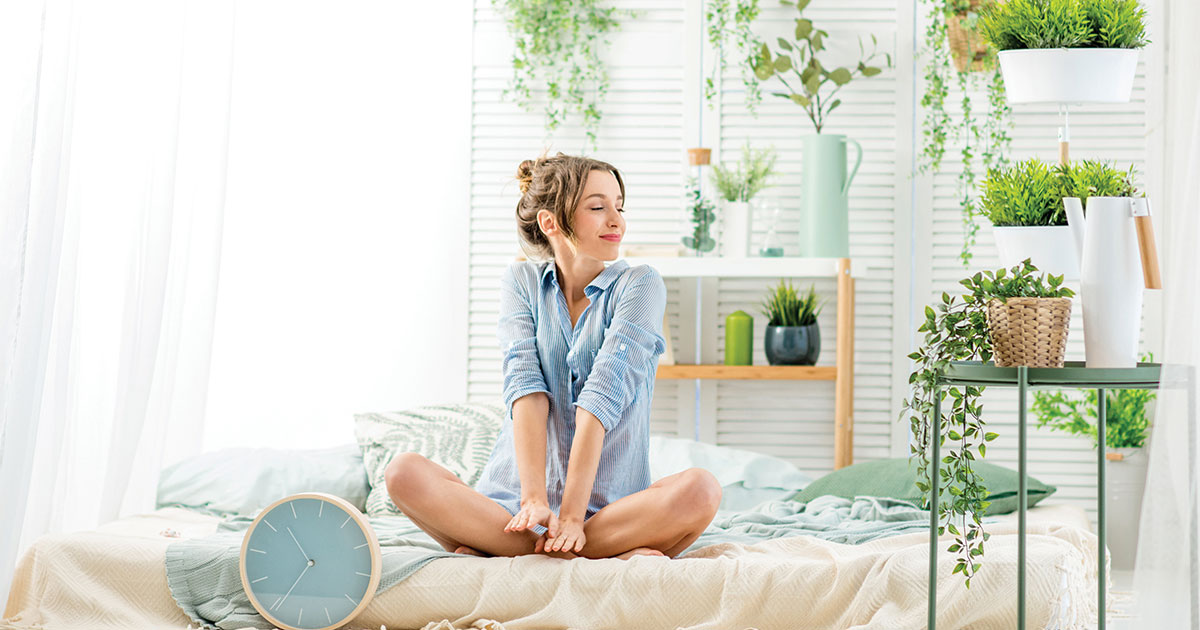Although it’s not easy to achieve in a busy household, creating a private retreat in your bedroom has become a real necessity – both for health and for sanity – and we all need a personal sanctuary that’s calm and conducive to the good sleep we know affects every aspect of our lives.
When working to stage this perfect, relaxing space, you can change the mood in your bedroom – literally overnight – with the addition of a few favorite houseplants that sleep experts (and NASA’s well-known clean air study) promise can help provide that good night’s rest! Happy news for those without a green thumb: most of these are easy to care for and can thrive in a bedroom windowsill. See which of these soothing – and hardworking – plants suit your bedroom style, and don’t forget to wipe their leaves once a week so they can continue to do their job!
English ivy: Its leaves can improve symptoms of allergies, and the plant itself can also reduce airborne mold. Plus, it makes a beautiful hanging basket in a bedroom window!
Snake plant: If you’d prefer, call it by its more whimsical name, mother-in-law’s tongue. This plant is known to emit oxygen at night and can filter harmful toxins from the air.
Peace lily: This easy-to-find variety increases the room’s humidity, which can aid in breathing while you sleep.
Philodendron: It’s a popular and hardy grower, and also perfect for small spaces and apartments.
Spider plant: No actual spiders here, we promise, but the plant does filter out pollutants.
Aloe vera: Besides its well-known healing properties, aloe vera also emits oxygen as you sleep, and in a study from NASA, was crowned one of the top air-improving plants in existence.
Lavender: A beloved aromatherapy plant, keeping lavender around your bedroom can also help your body relax, by slowing the heart rate and even lowering blood pressure.
Jasmine: One of the sweetest smelling options, jasmine can also reduce anxiety levels as you fall asleep. With its pale pink or white blooms, it’s also a pretty accent to your bedroom décor.
Eucalyptus: Besides clearing and soothing the sinuses, eucalyptus can actually elicit anti-insomnia benefits.
Golden pothos: Known for its bright green leaves and thin, delicate vines, this is the epitome of “easy to care for” – even in low light – and removes toxins from the air.
Gardenia: With its decidedly elegant appearance, gardenia plants also offer antibacterial and anti-inflammatory properties.
Areca palm: Along with adding a touch of the tropics to your nighttime refuge, areca palms are natural air humidifiers.
Gerbera daisies: Known to purify the air, this is the ideal plant if you’re also craving a pop of color!
Besides the obvious reason that seeing greenery and natural elements around your home actually makes you feel more relaxed and peaceful, plants such as these reduce carbon dioxide levels and airborne dust. Indoor house plants remove pollutants from the air by absorbing gases through their leaves and roots.
One precaution: While these popular houseplants can provide you with huge benefits, many varieties can also be poisonous to children and animals. Do your research before adding one to a bedroom spot that’s easily reached by toddlers or the family pet!
You’ll likely find taking care of your plants can also be restful therapy after a stressful workday, and the presence of greenery and flowers in hospital rooms has been thought to actually speed of the recovery process. Garden center, here we come!






















